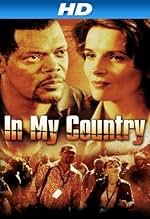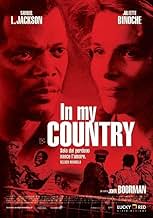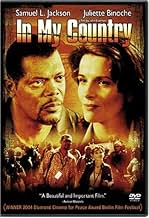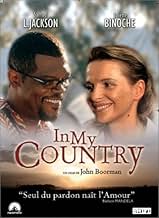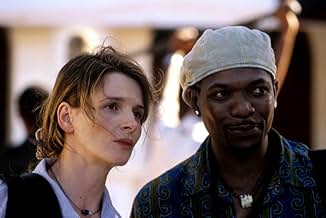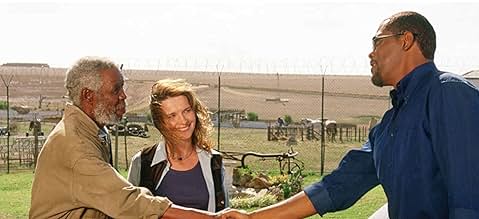Sullo sfondo delle udienze della Commissione sulla verità e Riconciliazione del Sud Africa, il giornalista del Washington Post, Langston Whitfield incontra Anna Malan, una poetessa Afrikaans... Leggi tuttoSullo sfondo delle udienze della Commissione sulla verità e Riconciliazione del Sud Africa, il giornalista del Washington Post, Langston Whitfield incontra Anna Malan, una poetessa Afrikaans che segue le udienze per conto di una radio sud africana.Sullo sfondo delle udienze della Commissione sulla verità e Riconciliazione del Sud Africa, il giornalista del Washington Post, Langston Whitfield incontra Anna Malan, una poetessa Afrikaans che segue le udienze per conto di una radio sud africana.
- Regia
- Sceneggiatura
- Star
- Premi
- 1 vittoria e 3 candidature totali
- Dumi Mkhalipi
- (as Menzi 'Ngubs' Ngubane)
- Albertina Sobandla
- (as Harriet Manamela)
- Sgt. de Smidt
- (as Daniel Robbertse)
Recensioni in evidenza
"In my Country", the movie based on this book in its American release, came and went quickly. We tried to see it during its debut, bu it disappeared from local screens in no time. We recently caught the movie on cable.
There are some interesting aspects of what the commission was trying to accomplish in trying to bring members of the repressive force to justice. As in other conflicts, the people that were involved in the atrocities keep repeating about how they were following orders, a poor excuse, since no one owned up to having done anything wrong. After all, this was a country in which a white minority controlled a big black majority, and who wanted to keep things unchanged.
At the center of the story is Anna Malan, a white South African, who is a radio personality. She follows the commission as more and more people are coming forward to tell their stories. A Washington Post black reporter, Langston Whitfield, is also covering the process. Inevitably, both come together. While they clash at first, they find common ground in their desire to tell the truth about South Africa.
Juliette Binoche and Samuel L. Jackson are seen as Anna and Langston. Both give good performances. Brendan Gleeson is seen as the evil De Jager, a man responsible for some of the crimes committed against the poor black of the country who were deemed terrorist by the controlling whites. Menzi Ngubone plays Dumi, Anna's assistant and Sam Ngakone makes a dignified appearance as Anderson, who works for Anna's family.
The film is interesting to watch as Mr. Boorman has given us a film to think about the criminal acts that were committed by a group of people that didn't stop to consider the consequences of what they were doing.
But why is it that In My Country doesn't pack the necessary heat to make one identify and feel upset for the characters on screen? I think a lot of it is down to the overall approach director John Boorman adopts. The film feels like several things at once rather than an actual case-study of post-Apartheid era events that will change and affect lives just as lives were changed and affected during the era. You might argue that the best way to tackle historical issues that deal with human cruelty to other humans is to set whatever story or narrative you're doing during the actual time thus giving a first hand account of what went down and how. Many films have done this in the past but films such as The Pianist and perhaps more notably The Deer Hunter are so vast in their scale that they manage to cover life prior to 'the event'; the event(s) themselves and then the aftermath of it all through either escape or returning to their former lives before 'the event'.
Interestingly, both those films look at prisoner of war scenarios, Jews to the Nazis and Americans to the Vietnamese, respectively. In My Country is more a look at what happens after 'the event', that being the Apartheid and all the atrocities that befell South Africa midway through the twentieth century. Trouble here is that the best the rest of the world can do here is show up, look glum at a couple of press conferences in which South African men of the law admit what they did and then report on the confessions, something that one character cannot even get much space for in his respective newspaper.
As a film alone, In My Country works as a re-telling of events that happened after an atrocity but it never delves deep into its subject matter. The Apartheid and the people involved in the Apartheid are not the central characters in fact they are relegated to giving accounts at timely spaced intervals throughout the film that hope to produce the odd tear from the audience. Families of the victims bursting into tears and music native to Africa that balres up try to add to the emotion felt in these scenes. But that's about as good as it gets with the rest of it crossing genres in and out of romance, historical, melodrama and the overall approach that gets tangled up that is the docu-drama.
At its very centre, In My Country has an American journalist named Langston Whitfield (Jackson) travelling to a country to cover events few people will have an interest in. It's interesting that a film dealing with the post-Apartheid era would have an American at its core as the lead male and not a South African. There is a South African lead of sorts but they are female and they are pulled up by Whitfield on more than one occasion about the treatment they gave the black inhabitants of the nation. Here there is a confused triangle of conflict; Whitfield is American and complains about Anna Malan's (Binoche) nation's treatment of blacks but as an American he could be read into as representing America, a powerful nation that did nothing about the Apartheid anyway. Then there is the fact Whitfield is black himself and his beef with Malan's nation's treatment of blacks could just be something personal.
The fact Malan is female in the first place immediately relegates her from what she would have been had the character been male. As a male, Malan would have made a good foil for Whitfield and the personal prejudice might not have existed as much. It's no secret that women in films have always been lowered somewhat when pitted against men indeed theorists have argued that all films are shot for the male audience in mind so women view things through a male perspective when watching a film. But the fact sexual tension is present in the film between these two adds another layer of confusion and opens up the possibility that the film could fall into the romance as well as the, shock, 'buddy' genre. They fit the bill in the sense they are binary opposites to one another (black/white; male/female; American/South African, etc.) and rebound dialogue off one another but is there really space for 'buddy' content in a film about post-Apartheid South Africa?
Twinned with this, there are other sloppy instances that aid the film in its mediocrity. When we first get an introduction of any sorts of chief villain De Jager (Gleeson), it is a visit to his house at night; complete with eerie music and we see a lot of animal heads on his wall he must be a baddie. As well as this clumsy labelling, De Jager's press conference right nearer the end does not act as the final moral catalyst for the film but rather as a plot point for Anna's family to ultimately fall apart which was unfortunate. While it's all nicely unfolded and cute for what it is, In My Country bogs itself down with confused studies and feels like a missed opportunity.
Jackson (Pulp Fiction) is Langston Whitfield from the Washington Post, sent to monitor the Truth and Reconciliation Commission hearings in South Africa. To avoid bloodshed, the commission asked white Afrikaners to appear before a public tribunal, confess exactly what they did, convince the commission they were acting under orders, make a believable apology, and amnesty will be given.
Bonoche (The English Patient, Chocolat)is Anna Malan, a poet, who is doing daily broadcasts for the South African Broadcasting Company.
Gleeson (In Bruges, Into the Storm, The Guard) is De Jager, a a South African cop with a zeal for torture and murder that went far beyond his job requirements; a reputed psychopath that is taking the fall for all the other criminals his superiors, in a new South Africa.
Anna finds out things she really didn't want to know, and Whitfield finds that truth is not so black and white, as he believed.
well its kinda movie about " black lives matter" thing. a married woman with kids has a job in radio. and she want to tell the truth to the country and world about the horrors happened to that country. where she met another black journalist from america. and then they both start working together to reveal more truth but also some romantic feelings which is kinda stupid. maybe she Pity soo much about black people ?.
-----------------spoilers (flaws)---------------
a married woman with two kids, sleeping with and between two black guys in same bed?
and then she kinda fall in love and didnt think about her kids? well because its not in the movie.
in the end the husband is angry but ok with everything ?
if there is no romnatic side story then this movie could done good.
Lo sapevi?
- QuizAfter seeing this film Nelson Mandela called it, "a beautiful and important film about South Africa's Truth and Reconciliation Commission. It will engage and influence not only South Africans, but people all over the world concerned with the great questions of human reconciliation, forgiveness, and tolerance."
- BlooperAll number plates on vehicles throughout the film (apart from archival footage) are fake and do not follow the format of older South African number plates.
- Citazioni
Anna Malan: [last lines - voiceover] Because of you, this land no longer lies between us but within. It breathes becalmed, after being wounded in its wondrous throat. In the cradle of my skulll it sings, it ignites my tongue. Five thousand stories are scorched on your skin. I am changed forever.. I want to say, forgive me, forgive me, forgive me.
- ConnessioniEdited into In My Country: Deleted Scenes (2005)
- Colonne sonoreSenzenina
Arranged by Murray Anderson & Warrick Swinney
Performed by Princess Soi-Soi Gqeza, Mxolisi Mayekane, Mandia Lande, Michael Ludonga, Simpiwe Matole & The New Teenage Gospel Choir
Published by Hi-Z Sound
I più visti
- How long is In My Country?Powered by Alexa
Dettagli
- Data di uscita
- Paesi di origine
- Siti ufficiali
- Lingue
- Celebre anche come
- Country of My Skull
- Luoghi delle riprese
- Aziende produttrici
- Vedi altri crediti dell’azienda su IMDbPro
Botteghino
- Budget
- 12.000.000 USD (previsto)
- Lordo Stati Uniti e Canada
- 163.893 USD
- Fine settimana di apertura Stati Uniti e Canada
- 22.383 USD
- 13 mar 2005
- Lordo in tutto il mondo
- 1.491.434 USD
- Tempo di esecuzione1 ora 45 minuti
- Colore
- Mix di suoni
- Proporzioni
- 1.85 : 1
Contribuisci a questa pagina



